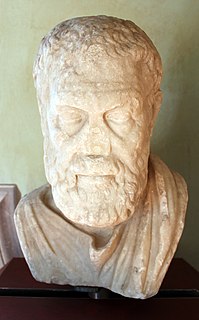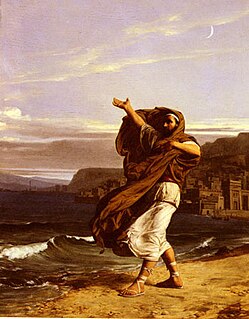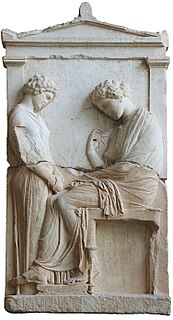
Demosthenes was a Greek statesman and orator of ancient Athens. His orations constitute a significant expression of contemporary Athenian intellectual prowess and provide an insight into the politics and culture of ancient Greece during the 4th century BC. Demosthenes learned rhetoric by studying the speeches of previous great orators. He delivered his first judicial speeches at the age of 20, in which he argued effectively to gain from his guardians what was left of his inheritance. For a time, Demosthenes made his living as a professional speech-writer (logographer) and a lawyer, writing speeches for use in private legal suits.
This article concerns the period 329 BC – 320 BC.
Year 324 BC was a year of the pre-Julian Roman calendar. At the time, it was known as the Year of the Dictatorship of Cursor. The denomination 324 BC for this year has been used since the early medieval period, when the Anno Domini calendar era became the prevalent method in Europe for naming years.
The denomination 322 BC for this year has been used since the early medieval period, when the Anno Domini calendar era became the prevalent method in Europe for naming years.
Year 390 BC was a year of the pre-Julian Roman calendar. At the time, it was known as the Year of the Tribunate of Ambustus, Longus, Ambustus, Fidenas, Ambustus and Cornelius. The denomination 390 BC for this year has been used since the early medieval period, when the Anno Domini calendar era became the prevalent method in Europe for naming years.

Hypereides or Hyperides was an Athenian logographer. He was one of the ten Attic orators included in the "Alexandrian Canon" compiled by Aristophanes of Byzantium and Aristarchus of Samothrace in the third century BCE.
He was a leader of the Athenian resistance to King Philip II of Macedon and Alexander the Great. He was associated with Lycurgus and Demosthenes in exposing pro-Macedonian sympathies. He is known for prosecuting Philippides of Paiania for his pro-Macedonian measures and his decree in honoring Alexander the Great.

The Athens Metro is a rapid-transit system in Greece which serves the Athens conurbation and parts of East Attica. It incorporates the former Athens-Piraeus Electric Railways (ISAP), which opened as a conventional steam railway in 1869, was electrified in 1904, and is now part of Line 1. Beginning in 1991, Attiko Metro constructed and extended Lines 2 and 3 and the Attiko Metro Operations Company (AMEL) operated these lines from 2000 to 2011. The metro network merged in 2011 when the Greek government created the Urban Rail Transport Company (STASY), a subsidiary of the Athens Urban Transport Organisation (OASA).
First Chairman and CEO of the merged company became Kostas Vassiliadis, a former Chief Engineer and later CEO of Athens-Piraeus Electric Railways.
The system is noted for being modern and efficient, in its own right and in comparison to other subway systems elsewhere. It has significantly changed Athens by providing a much-needed solution to the city's traffic and air pollution problem, as well as revitalising many of the areas it serves.
An extension of Line 3 is under construction towards Piraeus and also other extensions of existing lines, as well as a new line, are under consideration.
The Athens Metro is actively connected with the other means of public transport, such as buses, trolleys, the Athens Tram and the Proastiakos suburban railway. The Athens Metro is hailed for its modernity and many of its stations feature works of art, exhibitions and displays of the archeological remains found during its construction. Photography and video-taking is permitted across the whole network and street photographers often work in Athens Metro.

The ten Attic orators were considered the greatest orators and logographers of the classical era. They are included in the "Canon of Ten", which probably originated in Alexandria. A.E. Douglas has argued, however, that it was not until the second century AD that the canon took on the form that is recognised today.

Phryne was an ancient Greek courtesan (hetaira), from the fourth century BC. She is best known for her trial for impiety, where she was defended by the orator Hypereides.

Australia competed at the 2004 Summer Olympics in Athens, Greece from 13 to 29 August 2004. Australian athletes have competed in every Summer Olympic Games of the modern era. The Australian Olympic Committee sent a total of 470 athletes to the Games to compete in 29 sports.

The Lamian War, or the Hellenic War was fought by a coalition of cities including Athens and the Aetolian League against Macedon and its ally Boeotia. The war broke out after the death of the King of Macedon, Alexander the Great, and was part of a series of attempts to challenge Macedonian hegemony over mainland Greece.
Himerius was a Greek sophist and rhetorician. 24 of his orations have reached us complete, and fragments of 12 others survive.
Harpalus son of Machatas was an aristocrat of Macedon and boyhood friend of Alexander the Great in the 4th century BC. Being lame in a leg, and therefore exempt from military service, Harpalus did not follow Alexander in his advance within the Persian Empire but received nonetheless a post in Asia Minor. Alexander reportedly contacted him with a demand of reading material for his spare time. Harpalus sent his King theatrical plays by
Aeschylus, Sophocles and Euripides, the history of Philistus and odes by Philoxenus and Telestes.
Lycurgus was a logographer in Ancient Greece. He was one of the ten Attic orators included in the "Alexandrian Canon" compiled by Aristophanes of Byzantium and Aristarchus of Samothrace in the third century BC.
The 2010–11 Greek Cup was the 69th edition of the Greek Football Cup. A total of 67 clubs had been accepted to enter, after the withdrawal of Egaleo, Kalamata and Pyrsos Grevena and their relegation to Delta Ethniki.

Slavery was a common practice in ancient Greece, as in other societies of the time. Some Ancient Greek writers considered slavery natural and even necessary. This paradigm was notably questioned in Socratic dialogues; the Stoics produced the first recorded condemnation of slavery.
Archias of Thurii was an actor turned military agent of the Macedonian general Antipater in the 4th century BCE in ancient Greece. He was nicknamed "the hunter of the exiles" (φυγαδοθήρας).
Philippides, son of Philomelos, of Paiania was an Athenian aristocratic oligarch.
Collytus or Kollytos was a deme of ancient Attica, located in the city of Athens. It was located within the walls of Themistocles, south of the Areopagus and southwest of Acropolis. It was famed due to its association with Plato, whose family was from this deme.











